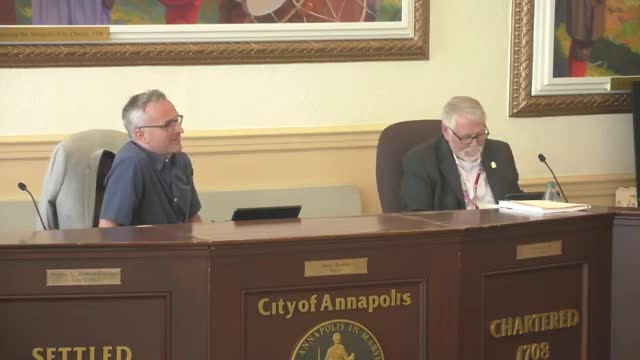Annapolis resilience update: DOE grant cancellations stall model‑code project; ferry RFP revised and rebates begin
Get AI-powered insights, summaries, and transcripts
Subscribe
Summary
Deputy City Manager Jackie Guile told the Environmental Matters Committee on Oct. 9 that a DOE grant to create a resilience‑based model code was identified for federal cancellation, while staff reported progress on streetlight assessments, a revised ferry RFP accepted by the FTA, and an electric‑leaf‑blower rebate program that launched Oct. 1.
Deputy City Manager Jackie Guile told the Environmental Matters Committee on Oct. 9 that a Department of Energy grant to develop a resilience‑based model code for small residential buildings has been flagged in a federal review that may cancel it, and that the resilience authority and technical partners are assembling deliverables while awaiting formal notice.
Guile said roughly “about $7,250,000,000 worth of grants, 223 grants” were reviewed and canceled at the federal level and that the resilience authority has not yet received official notice; once notified there is a 30‑day window to decide whether to appeal.
The committee received multiple status updates across resilience programs and projects:
- DOE grant for resilience model code: Staff and consultants (named in the briefing) had been working on a model code and data analysis; partners are preparing material in case an appeal is filed. Guile said the work completed to date could form the starting point for future city code work even if the grant is not restored.
- Streetlights and ownership analysis: A lighting assessment produced by Chenco/Tangle/Tango Lighting (as presented to staff) examined costs and savings if the city acquired and maintained all street lights currently owned or maintained by BGE. Guile said Maryland law enacted in the last year gives municipalities the right to purchase street lights; the city will review the assessment and decide whether to pursue acquisition.
- Greenhouse gas inventory and climate action plan: The city’s greenhouse‑gas inventory is complete and consultant Parrameda has assembled stakeholder working groups; the staff target is a draft climate action plan and community meetings with the goal of a final plan by the end of the calendar year.
- Green‑roof pilot for bus shelters: A pilot to install green roofs on up to five bus shelters is awaiting a proposal from the contractor who maintains existing green‑roof inventory; central services will decide whether maintenance can be absorbed or will need additional funding in the next budget cycle.
- Electric‑streetcar/trolley feasibility study: The Resilience Authority circulated a draft RFP for a trolley feasibility study and is seeking staff comments before it issues a final RFP.
- City ferry pilot project: The city revised its ferry RFP to a hybrid electric‑diesel propulsion configuration at the suggestion of federal reviewers to keep the FTA grant active; Guile said the FTA accepted the revision, a new agreement was received and approved by the Department of Labor, and central services expected to circulate a near‑final draft for advertising.
- Electric leaf‑blower rebate and enforcement: The city launched a rebate program on Oct. 1 administered by the Chesapeake Bay Trust offering rebates up to $100 for residential purchases and up to $1,500 for commercial landscapers; the city allocated $105,000 to the program. Planning & Zoning and Public Works inspectors are authorized to investigate complaints; the city is hiring a temporary, part‑time enforcement position to patrol for violations for approximately three months, with the hire required to be available to testify if citations are appealed through March 2026. Committee members raised enforcement protocol questions about prioritizing fines against landscapers when identifiable businesses are involved.
- Harbor task force report and follow up: Staff praised a task force report on harbor operations and recommended preparing a resolution to accept the task force recommendations; chairs are finalizing editorial changes before filing a resolution.
- Climate‑change litigation: Guile said oral arguments were held Oct. 6 before the Supreme Court of Maryland in a joint appeal involving the cities of Baltimore and Annapolis and Anne Arundel County; the court could take 60 to 90 days to issue a decision.
What the committee did not decide: No formal policy changes were enacted at the meeting; the update recorded staff work, assessments and next steps for items that require further executive or council decisions.
Next steps and risks: The DOE grant cancellation introduces a short‑term risk to the model‑code project; staff said they may seek one‑time budget funding if the appeal fails. Ferry procurement, streetlight acquisition and green‑roof implementation require interdepartmental coordination and potential budget action.
